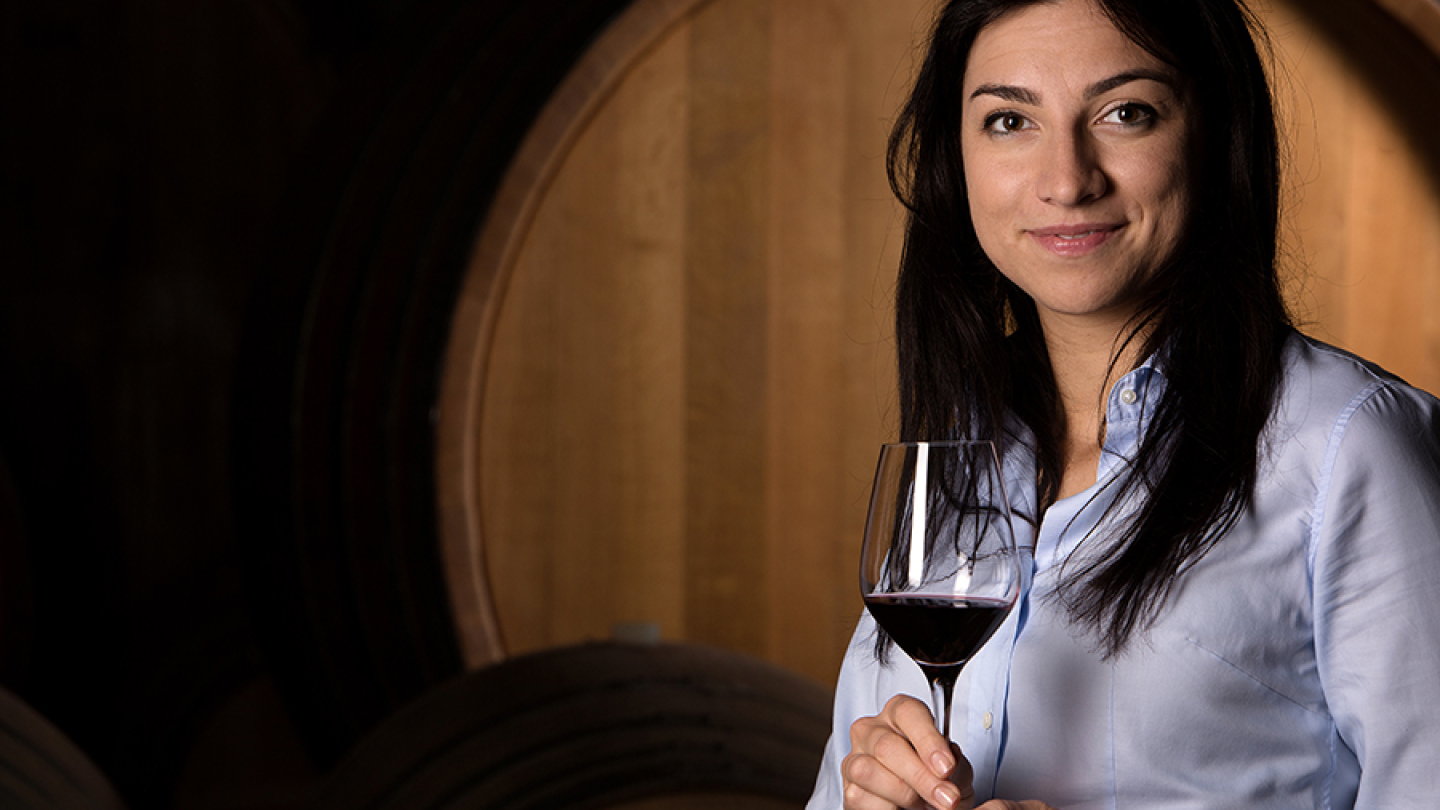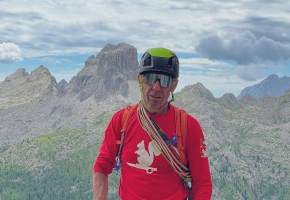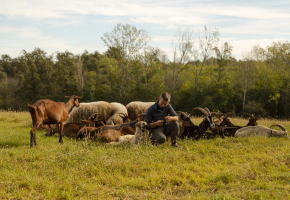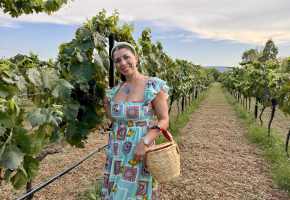
Icons of Italian service
The Vajra family: Langhe’s best winery - A story of Italian excellence

Francesca Vajra shares the story of her family's legacy and their renowned winery nestled in the heart of Barolo. Discover how they epitomize the essence of Italian excellence through the production of exceptional wines.
Francesca, wine producer
Tell us about yourself and your winery.
Our family, at the helm of G.D. Vajra is an integral part of the history of the Langhe region, with our winery located in the heart of Barolo, a favorite destination for wine lovers in search of authenticity and quality.
My father Aldo, at just 15 years old, became a pioneer of organic farming in Piedmont. He laid the foundation for our family vineyards and through an innate passion for nature and viticulture, turned a youthful dream into reality, creating wines renowned for their finesse and elegance.
With the support of my mother Milena and the guidance of local farmers, Aldo embraced sustainable farming practices, despite challenges like the hailstorm of 1986. Our family has inspired both us children and the farmers in the area, who have entrusted their vineyards to our care.
My brothers Giuseppe and Isidoro and I joined the company, enriching our collective vision. Through in-depth studies of terroir and collaborations with researchers, we have developed innovative winemaking practices.
Today, G.D. Vajra is a symbol of our commitment to creating wines that reflect our land and heritage. Each bottle tells the story of our passion, resilience, and discovery.
What is your winemaking philosophy and what are the core values of your winery?
Our philosophy is rooted in attention to detail and creativity respectful of tradition. In addition to renowned wines like Barolo, Nebbiolo, and Barbera, we revive varieties such as Freisa and Dolcetto, introduce Riesling Renano, and rediscover ancient winemaking processes, as with Claré J.C., a Nebbiolo vinified in purity. We directly manage the vineyards to ensure the quality and uniqueness. Each bottle possesses personality and bears witness to our passion for the land and winemaking.
What are the distinctive characteristics of your wines and what makes them unique in the market?
G.D. Vajra wines stand out for their high-altitude vineyards and style. With 80 hectares of vineyards in various areas of Barolo, we offer a range focused on indigenous grape varieties such as Nebbiolo, Dolcetto, Barbera, and Freisa, enriched by international varieties like Riesling and Pinot Noir.
How do you select grapes for your wines and what is your preferred winemaking process?
We hand-harvest and triple-sort the grapes: on the vine, at cluster level, and individual berries after destemming. We transport them in small 20kg crates for gentle handling, maintaining a delicate approach. Winemaking occurs with utmost respect for biodiversity and the land. We use stainless steel fermentation and aging in Slavonian oak barrels or stainless steel, depending on the wine.
What specific challenges do you encounter in the current wine market and how do you address these challenges?
In the current market, we face challenges such as mass tourism and the trend towards dealcoholized wines. Our distinctive choice is to promote biodiversity and the history of our land, educating consumers rather than just satisfying them. We aim to transmit wine culture, reminding us that wine, when consumed moderately, doesn't need additives. Moreover, wine tasting while on vacation enriches cultural experiences, allowing for greater enjoyment of cuisine and the people who produce it.
What aspect of your work gives you the greatest satisfaction?
The most rewarding aspect of my work is seeing guests return home enriched, having discovered something unique and rediscovered the value of beauty and goodness. I can perceive it in their looks and smiles. I am grateful to contribute to spreading a bit of beauty in the world.
What is your role in promoting wine tourism in your region?
For years, I have promoted G.D. Vajra both abroad and domestically, including in our Tasting Room. This experience has driven me to offer visitors to our Winery an opportunity to fully immerse themselves in the beauty of the Langhe and the Barolo area.
Can you share an anecdote that has stuck with you from your years working in this industry?
Two recent episodes have deeply impacted me. The first involves a young American couple, newlyweds, whom I met during a tasting in the United States. Upon returning to visit, years later, to celebrate their tenth wedding anniversary, we were delighted to welcome them again, this time in the company of their three children.
The second story involves a family with three teenage children visiting the winery. Although the father had booked the experience mainly for himself, he expressed gratitude for making the experience engaging for the whole family, making that day one of the most memorable moments of their trip to Italy.
What does going the extra mile mean to you?
For us, going the extra mile means understanding guests' expectations and trying to surpass them. In dialogue, we like to discover what brings them to GD VAJRA (a wine tasted in a restaurant, an article, word of mouth...) as well as the many desires that are not expressed. We like to create beautiful moments by helping people leave having truly discovered something new, whether it's a wine, an anecdote, a corner of Piedmont to explore, or a dish to taste. But also unexpected corners of our cellar: the stained glass windows and their incredible history, the secret garden that with its plants creates a beautiful atmosphere in the aging cellar… We especially love to see them leave with bright eyes for a desire for beauty even more aware and alive. This, for us, is the "proof of the pudding." But well, perhaps one must really come and try to understand all this!
What is your favorite place in the region where your winery is located?
Among the most beloved places in our region, Bricco delle Viole holds a special place in my heart. Located on the western hills of Barolo, this vineyard is the highest in the municipality, embracing an altitude ranging from 400 to 480 meters above sea level. What truly makes it unique is the breathtaking view of the Alps and the Po Valley, the constant breeze that runs through it, and the silence that envelops it. With a mild climate in winter and never excessively hot in summer, Bricco delle Viole lends our Barolo a unique complexity and character.
What initiatives have you undertaken to improve environmental sustainability in your winery and in the wine industry in general? Are there specific techniques you adopt?
Aldo Vaira adopted organic farming as early as 1971, pioneering the approach in Piedmont. Since then, our vineyards have been defended with spontaneous cover crops for 50 years, promoting soil aeration and preventing erosion. Our vineyards are certified and managed with a manual work ratio per hectare that reflects love and dedication. Recently, we have focused research on enhancing biodiversity, monitoring flora and fauna in our lands. Additionally, we are proud to be an EQUALITAS company, a certification that attests to respect for certain sustainability and social responsibility standards.
How do you think the wine industry can improve to better preserve the environment and ensure the long-term sustainability of wine production?
To ensure the long-term sustainability of wine production, it is essential to pay greater attention to biodiversity, enriching the range of wines offered. It is crucial to value the work of farmers, which contributes to the beauty of the territory and its sustainability.
What are your future goals for your winery and how do you foresee the wine industry evolving in the coming years?
Our goal is to extend and improve spaces to welcome guests to our winery. The wine industry is undergoing a period of great evolution, but as farmers, we are used to questioning how we can favor nature and adapt to the challenges that arise. With this same approach, we will tackle the future challenges of the wine industry.
Related articles
10154
Torino (TO)


